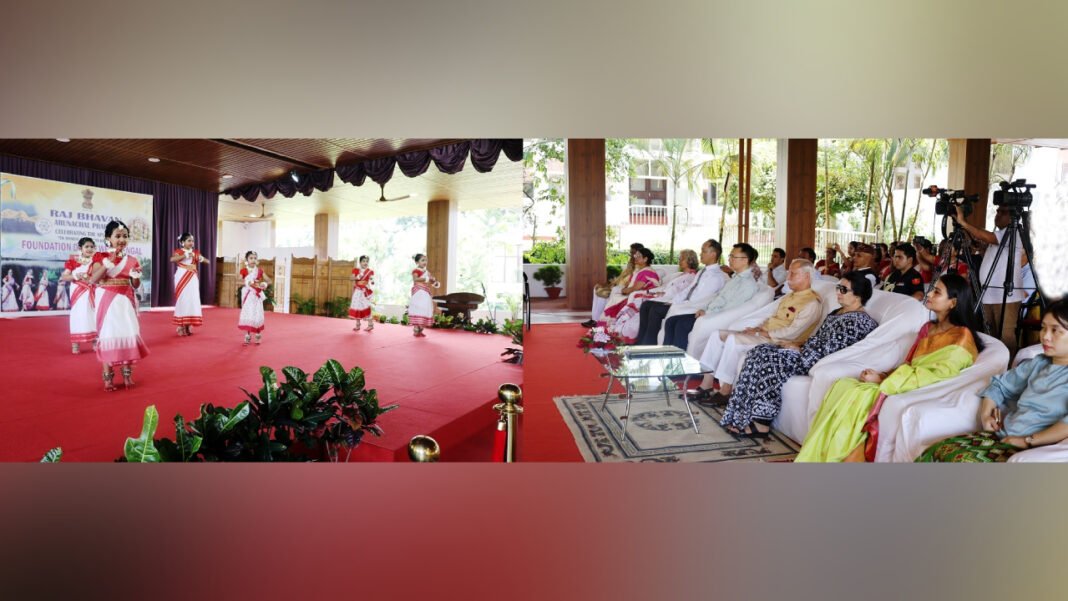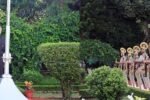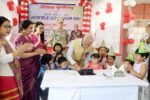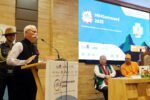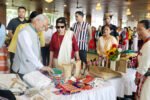HT Bureau
NAMSAI, June 20: In a vibrant celebration of India’s cultural mosaic, the Arunachal Pradesh Raj Bhavan observed West Bengal Diwas on Friday, showcasing the rich traditions and heritage of the Bengali and Gorkha communities residing in the state.
The event, held in the spirit of Ek Bharat Shreshtha Bharat, brought together community members, students, and dignitaries in a colourful expression of inter-state harmony and cultural unity.
According to an official statement, the Governor of Arunachal Pradesh, Lt General K T Parnaik, PVSM, UYSM, YSM (Retd), and the First Lady of the State, Anagha Parnaik, graced the occasion and participated wholeheartedly in the day’s festivities.
Extending his greetings on the Statehood Day of West Bengal, the Governor congratulated the Bengali and Gorkha communities for their longstanding and significant contributions to the development and progress of Arunachal Pradesh.
He acknowledged the communities’ commitment to education, cultural richness, and social cohesion, which have, over the years, become a valuable part of Arunachal’s societal fabric.
The Governor remarked that West Bengal has historically been a land of revolutionary thought and reformist leaders.
Recalling figures like Raja Ram Mohan Roy, who spearheaded the abolition of regressive practices like Sati and dowry, he said that the state’s intellectual and cultural renaissance has shaped modern India.
The Governor also lauded the contributions of institutions such as the Ramakrishna Mission and Vivekananda Kendra Vidyalayas, which have played a crucial role in strengthening the education system of Arunachal Pradesh.
He stated that these institutions reflect the values that bind the people of West Bengal and Arunachal Pradesh—values rooted in service, education, and inclusive growth.
Highlighting the importance of cultural celebrations, the Governor stated that such occasions provide young students a platform to learn about the diversity that defines India.
He noted that exposure to different traditions fosters empathy, understanding, and respect—essential qualities for nurturing a united and inclusive nation.
Cultural exchanges like West Bengal Diwas, he said, are not merely symbolic but instrumental in building intergenerational respect for India’s diversity.
The celebration featured a series of vibrant cultural performances that reflected the shared spirit of celebration and unity.
Students from the Nrityangan Dance & Music Academy, Itanagar, performed the traditional Bengali folk dance Aaj Dhaner Khete, capturing the agrarian spirit of rural Bengal.
They also presented the renowned Bengali patriotic song Dhono Dhanye Pushpe Bhora, written by poet Dwijendralal Roy, which evoked themes of nature and national pride.
Adding to the diversity of the programme, a traditional Gorkhali dance, Kadam Chala, was performed with great energy by Lhamu Dolma Tamang, Ghendun Lhamu Tamang, and Shruti Biswakarma, paying tribute to the vibrant culture of the Gorkha community.
In a special Arunachali gesture of unity, students from PM SHRI Arunodaya School, Itanagar, presented the local folk dance Ngo Sisang ne Dolung Lokke Mimum, weaving together the cultural ethos of the host state with the visiting celebration.
The highlight of the programme was a moving performance of the traditional Bengali duet folk dance Sohag Chand Bodhoni, based on Bengali wedding rituals.
This performance was rendered with grace by two tribal students from Arunachal Pradesh—Miss Techi Ajum of Class VIII, Vivekananda Kendra Vidyalaya, Itanagar, and Miss Tarh Dai of Class XI, Kendriya Vidyalaya, Itanagar.
Their participation symbolised the deep cultural integration fostered through such initiatives and stood as a testament to the Governor’s vision of intercultural understanding and youth engagement.
The Sisters and students of Sacred Heart Convent & Day Care, Itanagar, were present as special guests of the Governor, adding to the warmth and inclusivity of the occasion.
A message from the Governor of West Bengal, Dr. C. V. Ananda Bose, was read out as part of the programme, reinforcing the bonds of goodwill between the two states.
The event concluded with a high tea hosted by the Governor and the First Lady for all participants and guests.
They engaged warmly with members of the Bengali and Gorkha communities, expressing appreciation for their efforts in preserving and promoting their cultural traditions within the broader framework of Arunachal’s society.
In his closing remarks, the Governor reiterated that such celebrations are crucial in strengthening national integration.
He affirmed that building a culture of mutual respect and understanding among India’s diverse communities—especially through youth-led cultural exchange—is foundational to achieving an inclusive, resilient, and harmonious society.


